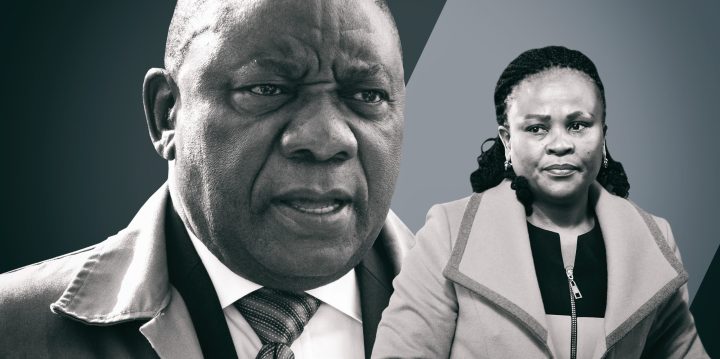MEMBERS ETHICS CODE OP-ED
Donations to political party candidates must now see the light of day after successful court challenge by amaBhungane

The amaBhungane Centre for Investigative Journalism has achieved a landmark victory in the fight against the secret capturing of members of the executive.
In July of this year, the Constitutional Court set aside findings by the Public Protector that President Cyril Ramaphosa had acted unlawfully in various respects relating to donations made to his CR17 election campaign. This was because the president did not have a duty under the Executive Members’ Ethics Code (the Code), passed pursuant to the Executive Members’ Ethics Act of 1998, to disclose such donations as, according to the court, he did not personally benefit from these donations.
The existing Code requires the disclosure of gifts, sponsorships or benefits received by a member of the executive in his or her private capacity. Accordingly, any donation to an internal party campaign in support of a member of the executive is not required to be disclosed, so long as the campaign exists as its own legal entity separate from the member concerned (like the CR17 campaign).
The amaBhungane Centre for Investigative Journalism has now successfully challenged this aspect of the Code. In a judgment penned by Judge President Dunstan Mlambo, Judge Keoagile Matojane and Judge Raylene Keightley, it was confirmed that the high court had previously dismissed amaBhungane’s challenge purely “on technical grounds”.
Those technical grounds were each overturned by the Constitutional Court in July and the high court was accordingly required to determine the merits of amaBhungane’s constitutional challenge to the Code.
AmaBhungane did not seek any relief against the president, nor did it seek to argue that the president was incorrect in arguing, as he did in his successful application to review the Public Protector’s findings against him, that the Code did not require the disclosure of donations made to the CR17 campaign as these donations were not made to him personally but rather to a political campaign.
What amaBhungane did seek, however, was a declaration that the Code was unconstitutional to the extent that it did not require members of the executive to disclose donations made in support of their internal political campaigns. amaBhungane argued that, in the interests of openness, transparency and accountability, the public should have the right to know who has donated to the campaigns of members of the executive, particularly where those campaigns eventually result in the member taking high public office. amaBhungane’s challenge to the Code thus sought to ensure that private monies are not used to improperly influence those elected to public office, power is not able to be “bought” via secret campaign donations and politicians are not able to use public office to favour those who fund their campaigns in the dark.
The president opposed amaBhungane’s challenge to the Code, arguing that no amendments were required, as the Code already requires the disclosure of donations from which members of the executive derive personal benefit and most campaign donations for internal party-political elections would constitute a “personal benefit”, which would be disclosable under the Code.
The high court held, however, that:
“[A]s things stand at present, we know that the Code requires disclosure of internal party-political campaign funding by Members if this constitutes a personal benefit. However, what Members and the public do not know with certainty, is what constitutes a personal benefit beyond the obvious case where money is given directly to, or placed at the disposal of, the Member herself.”
The high court confirmed amaBhungane’s argument that Section 96 of the Constitution requires a code of ethics for members of the executive which guards against risk of a conflict between a member’s official responsibilities and private interests and that an effective means of achieving this objective is to require the disclosure of campaign funding donations:
“The only way in which effectively to meet the constitutional objectives of accountable, transparent and open government, and to ensure that Members are not put at risk of a conflict between their official responsibilities and their private interests is for the Code to make it clear that Members are obliged in all instances to make disclosure of internal election campaign donations received from members of the public. It is through such required disclosure by Members that the public’s constitutional right to information and their right to engage in political activities is promoted and fulfilled.”
As a result of the deficiencies in the Code, the high court held that the Code is unconstitutional, unlawful and invalid insofar as it does not require the disclosure of donations made to political campaigns for positions within political parties. Parliament has 12 months within which to correct this defect. AmaBhungane must now apply to the Constitutional Court to confirm the high court’s declarations of the Code’s unconstitutionality.
The high court’s judgment is a landmark victory in the fight against the secret capturing of members of the executive – members must now disclose all donations to political campaigns in support of their election to positions within their respective parties and can no longer keep such donations a secret from the public.
Greater transparency in respect of private funding to politicians can only provide more protection against improper private influence over public officials and deter politicians from serving their private funders’ interests at the expense of the public. DM
Dario Milo is a partner and Lavanya Pillay a senior associate at Webber Wentzel. They acted for amaBhungane in the litigation.
[hearken id=”daily-maverick/8881″]


















 Become an Insider
Become an Insider
Congratulations AmaBhungane! Viva transparency – we need to know who is funding political campaigns.
Now lets see if the political parties adhere to this.
If this is enforced, cans of worms will emerge. If we could get to the truth it would be incredible.
For sure. Well done Sam and AmaB.